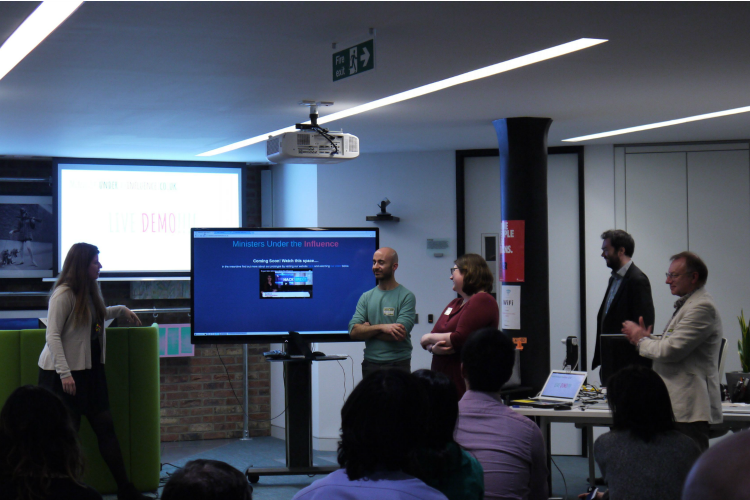Hack Brexit presents its first fact-checking and dataviz tools
Published 30 January 2017 by Elsa Ferreira
One month after Brexit, there was Hack Brexit, a hackathon to create tools that counteracted messy or misleading political campaigns. Six months later, the collective presents its first two prototypes.
London, from our correspondent
Rendez-vous in central London on January 24 for Hack Brexit. The collective is celebrating its six-month anniversary. In July 2016, one month after the vote that determined Great Britain’s exit from the European Union, Laura Paterson and Charlotte Fereday, soon joined by Nick Wasmuth, decided to organize a hackathon to “stimulate positive debate around our relationship with the EU,” according to Wasmuth. While the organization is non-partisan, the majority of participants voted to remain part of the EU, he admits. “Tech is one of the sectors most at risk. We depend on people coming to London under the label of the European Union, there’s no point in limiting that.”

Since their first meeting, the group has expanded to more than 600 members. In July, the hackathon resulted in 10 projects. The organizers selected two for their “open source incubator,” which provides teams with a physical space and assigns individuals to accompany the development of the prototypes. After six months of volunteer work, Hack Brexit presents What The Fact, a fact-checking browser extension, and Ministers Under The Influence, a datavisualization site for politics.
First up, What The Fact is a Chrome extension that allows you to highlight controversial parts of an article, query a database linked to fact-checking services by partner organizations (including FactCheck, a project by the University of Pennsylvania) and receive the verdict: fake or not fake.
The project is only in MVP (minimum viable product) phase, says Jialu Tu, technical operator by day, who developed it during his spare time. In order for the system to find an occurrence, the text must be exactly the same as it is entered into the database. But the extension can only improve with use over time: “If users massively highlight the same facts, it becomes valuable information for our partner organizations,” he adds.
Transparency
Next up, Ministers Under the Influence (MUI) was developed under the impulse of Unlock Democracy, a group that advocates for greater transparency in British politics. In the UK, the government and deputies have an obligation to publish certain data, explains Alexandra Runswick, director of Unlock Democracy. This includes a list of people they meet, the topic of their meetings and a list of people from whom they receive hospitality and gifts. But they all respond in a variety of formats that prevent in-depth analysis, or simply remain evasive. “For example, the Minister of the Environment notes as the reason for all his appointments ‘the environment and climate change’. Technically it may be true, but it’s hardly transparent,” she says.

MUI’s objective is therefore to make all this information readable and accessible to all, for free. The team cleaned up the data and organized it into graphs. Among other revelations, we learn that Prime Minister David Cameron met the British defense company BAE Systems 24 times during his six years in office.
The next step is to integrate context (Why these meetings?) and timeliness (Were important decisions made following these meetings?). The platform is scheduled to launch in the following weeks at ministersundertheinfluence.co.uk.
And tomorrow?
Ed Dowding, founder of the online voting platform Represent tempers Hack Brexit’s enthusiasm: “Sometimes there is a naive side of hackathons where participants forget to use Google and create things that already exist.” Fact-checking and datavisualization tools are already commonly used by journalists, even more so since the election of Donald Trump. Some media have even mobilized themselves in the context of “post-truth” and “alternative facts” to produce new tools.
The Washington Post has just launched RealDonaldContext, a Chrome extension that adds context to Tweets by the U.S. president (verified by Washington Post journalists). Slate released the Chrome extension This is Fake, which identifies links to unreliable sources. In France, Le Monde is fine-tuning Décodex, which, very soon, will recognize an unreliable website or provide information on its owners and shareholders.
There's important context missing. pic.twitter.com/1gKg1y8S7q
— RealDonaldContext (@realDonaldCntxt) January 29, 2017
Hack Brexit is more targeted at organizations that are “90% lacking in technical resources,” says Wasmuth. “We’re not here to reinvent the wheel. We want to work together, to see how we can integrate into the ecosystem.”
According to him, one thing is certain: “Talented and enthusiastic people” are getting political and are ready to invest time in these projects. The proof is already in the increase in membership these past weeks. No doubt current affairs also have something to do with it. Between the beginning of the Brexit process and Trump, there’s work to be done…
